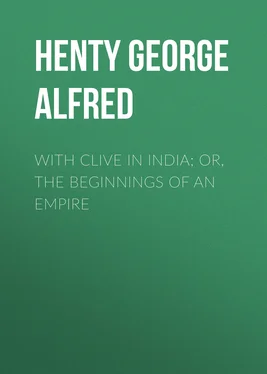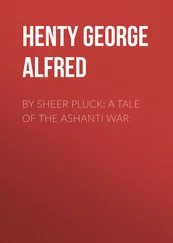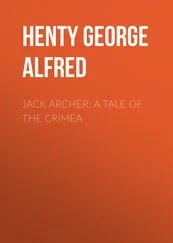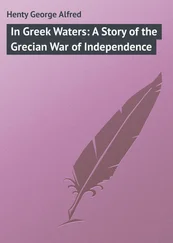George Henty - With Clive in India; Or, The Beginnings of an Empire
Здесь есть возможность читать онлайн «George Henty - With Clive in India; Or, The Beginnings of an Empire» — ознакомительный отрывок электронной книги совершенно бесплатно, а после прочтения отрывка купить полную версию. В некоторых случаях можно слушать аудио, скачать через торрент в формате fb2 и присутствует краткое содержание. Жанр: foreign_children, foreign_antique, foreign_prose, prose_military, на английском языке. Описание произведения, (предисловие) а так же отзывы посетителей доступны на портале библиотеки ЛибКат.
- Название:With Clive in India; Or, The Beginnings of an Empire
- Автор:
- Жанр:
- Год:неизвестен
- ISBN:нет данных
- Рейтинг книги:5 / 5. Голосов: 1
-
Избранное:Добавить в избранное
- Отзывы:
-
Ваша оценка:
- 100
- 1
- 2
- 3
- 4
- 5
With Clive in India; Or, The Beginnings of an Empire: краткое содержание, описание и аннотация
Предлагаем к чтению аннотацию, описание, краткое содержание или предисловие (зависит от того, что написал сам автор книги «With Clive in India; Or, The Beginnings of an Empire»). Если вы не нашли необходимую информацию о книге — напишите в комментариях, мы постараемся отыскать её.
With Clive in India; Or, The Beginnings of an Empire — читать онлайн ознакомительный отрывок
Ниже представлен текст книги, разбитый по страницам. Система сохранения места последней прочитанной страницы, позволяет с удобством читать онлайн бесплатно книгу «With Clive in India; Or, The Beginnings of an Empire», без необходимости каждый раз заново искать на чём Вы остановились. Поставьте закладку, и сможете в любой момент перейти на страницу, на которой закончили чтение.
Интервал:
Закладка:
So well was this battery placed, and so accurate the aim of its gunner, that the very first shot dismounted one of the eighteen-pounders in the fort. The second again struck the gun and completely disabled it. The besieged mounted their second heavy gun in its place, and were preparing to open fire on the French battery, when a shot struck it also and dismounted it. It was useless to attempt to replace it, and it was, during the night, removed to a portion of the walls not exposed to the fire of the enemy's battery. The besiegers continued their fire, and in six days had demolished the wall facing their battery, making a breach of fifty feet wide.
Clive, who had now only the two young subalterns serving under him, worked indefatigably. His coolness and confidence of bearing kept up the courage of his little garrison, and every night, when darkness hid them from the view of the enemy's sharpshooters, the men laboured to prepare for the impending attack. Works were thrown up inside the fort, to command the breach. Two deep trenches were dug, one behind the other; the one close to the wall, the other some distance farther back. These trenches were filled with sharp iron three-pointed spikes, and palisades erected extending from the ends of the ditches to the ramparts, and a house pulled down in the rear to the height of a breastwork, behind which the garrison could fire at the assailants, as they endeavoured to cross the ditches.
One of the three field pieces Clive had brought with him he mounted on a tower, flanking the breach outside. Two he held in reserve, and placed two small guns, which he had found in the fort when he took it, on the flat roof of a house in the fort commanding the inside of the breach.
From the roofs of some of the houses around the fort the besiegers beheld the progress of these defences; and Riza Sahib feared, in spite of his enormously superior numbers, to run the risk of a repulse. He knew that the amount of provisions which Clive had stored was not large, and thinking that famine would inevitably compel his surrender, shrank from incurring the risk of disheartening his army, by the slaughter which an unsuccessful attempt to carry the place must entail. He determined, at any rate, to increase the probability of success, and utilize his superior forces, by making an assault at two points, simultaneously. He therefore erected a battery on the southwest, and began to effect a breach on that side, also.
Clive, on his part, had been busy endeavouring to obtain assistance. His native emissaries, penetrating the enemy's lines, carried the news of the situation of affairs in the fort to Madras, Fort Saint David, and Trichinopoli. At Madras a few fresh troops had arrived from England, and Mr. Saunders, feeling that Clive must be relieved at all cost, however defenceless the state of Madras might be, despatched, on the 20th of October, a hundred Europeans and a hundred Sepoys, under Lieutenant Innis. These, after three days' marching, arrived at Trivatoor, twenty-two miles from Arcot.
Riza Sahib had heard of his approach; and sent a large body of troops, with two guns, to attack him. The contest was too unequal. Had the British force been provided with field pieces, they might have gained the day; but, after fighting with great bravery, they were forced to fall back; with a loss of twenty English and two officers killed and many more wounded, while the Sepoys suffered equally severely.
One of Clive's messengers reached Murari Reo, the Mahratta chief of Gutti. This man was a ferocious free-booting chief, daring and brave himself, and admiring those qualities in others. Hitherto, his alliance with Muhammud Ali was little more than nominal, for he had dreaded bringing upon himself the vengeance of Chunda Sahib and the French, whose ultimate success in the strife appeared certain. Clive's march upon Arcot, and the heroic defence which the handful of men there were opposing to overwhelming numbers, excited his highest admiration. As he afterwards said, he had never before believed that the English could fight, and when Clive's messenger reached him, he at once sent back a promise of assistance.
Riza Sahib learned, almost as soon as Clive himself, that the Mahrattas were on the move. The prospects of his communications being harassed, by these daring horsemen, filled him with anxiety. Murari Reo was encamped, with six thousand men, at a spot thirty miles to the west of Arcot; and he might, at any moment, swoop down upon the besiegers. Although, therefore, Riza Sahib had for six days been at work effecting a new breach, which was now nearly open to assault, he sent on the 30th of October a flag of truce, with an offer to Clive of terms, if he would surrender Arcot.
The garrison were to be allowed to march out with their arms and baggage, while to Clive himself he offered a large sum of money. In case of refusal, he threatened to storm the fort, and put all its defenders to the sword. Clive returned a defiant refusal, and the guns again opened on the second breach.
On the 9th of November, the Mahrattas began to show themselves in the neighbourhood of the besieging army. The force under Lieutenant Innis had been reinforced, and was now under the command of Captain Kilpatrick, who had a hundred and fifty English troops, with four field guns. This was now advancing.
Four days later the new breach had attained a width of thirty yards, but Clive had prepared defences in the rear, similar to those at the other breach; and the difficulties of the besiegers would here be much greater, as the ditch was not fordable.
The fifty days which the siege had lasted had been terrible ones for the garrison. Never daring to expose themselves unnecessarily during the day, yet ever on the alert to repel an attack; labouring at night at the defences, with their numbers daily dwindling, and the prospect of an assault becoming more and more imminent, the work of the little garrison was terrible; and it is to the defences of Lucknow and Cawnpore, a hundred years later, that we must look to find a parallel, in English warfare, for their endurance and bravery.
Both Charlie Marryat and Peters had been wounded, but in neither case were the injuries severe enough to prevent their continuing on duty. Tim Kelly had his arm broken by a ball, while another bullet cut a deep seam along his cheek, and carried away a portion of his ear. With his arm in splints and a sling, and the side of his face covered with strappings and plaster, he still went about his business.
"Ah! Yer honors," he said one day to his masters; "I've often been out catching rabbits, with ferrits to drive 'em out of their holes, and sticks to knock 'em on the head, as soon as they showed themselves; and it's a divarshun I was always mightily fond of, but I never quite intered into the feelings of the rabbits. Now I understand them complately, for ain't we rabbits ourselves? The officers, saving your presence, are the ferrits who turn us out of our holes on duty; and the niggers yonder, with their muskets and their matchlocks, are the men with sticks, ready to knock us on head, directly we show ourselves. If it plase Heaven that I ever return to the ould country again, I'll niver lend a hand at rabbiting, to my dying day."
Chapter 8: The Grand Assault
The 14th of November was a Mohammedan festival, and Riza Sahib determined to utilize the enthusiasm and fanatic zeal, which such an occasion always excites among the followers of the Prophet, to make his grand assault upon Arcot, and to attack at three o'clock in the morning. Every preparation was made on the preceding day, and four strong columns told off for the assault. Two of these were to attack by the breaches, the other two at the gates. Rafts were prepared to enable the party attacking by the new breach to cross the moat, while the columns advancing against the gates were to be preceded by elephants, who, with iron plates on their foreheads, were to charge and batter down the gates.
Читать дальшеИнтервал:
Закладка:
Похожие книги на «With Clive in India; Or, The Beginnings of an Empire»
Представляем Вашему вниманию похожие книги на «With Clive in India; Or, The Beginnings of an Empire» списком для выбора. Мы отобрали схожую по названию и смыслу литературу в надежде предоставить читателям больше вариантов отыскать новые, интересные, ещё непрочитанные произведения.
Обсуждение, отзывы о книге «With Clive in India; Or, The Beginnings of an Empire» и просто собственные мнения читателей. Оставьте ваши комментарии, напишите, что Вы думаете о произведении, его смысле или главных героях. Укажите что конкретно понравилось, а что нет, и почему Вы так считаете.












